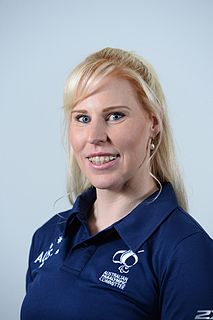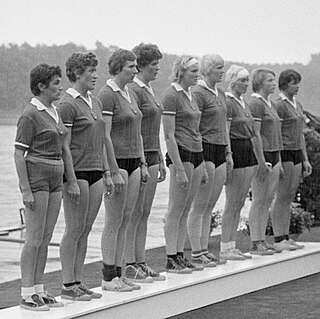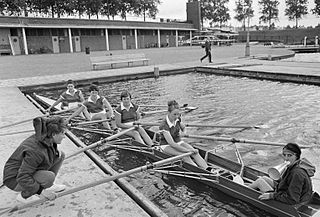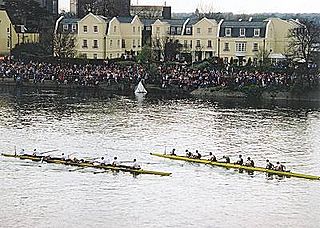
Elisabeta Lipă is a retired rower and government official from Romania. She is the most decorated rower in the history of the Olympics, winning five gold, two silver and one bronze medals. She holds the record amongst rowers for the most years between gold medals, at 20 years.

Antanas Žmuidzinavičius was a Lithuanian painter and art collector. Sometimes he used Antanas Žemaitis as his pen name.

Sofija "Soja" Jovanović was the first Serbian and Yugoslavian woman director, noted for her work in theater, TV and film productions.
Sofija Veiverytė was a Lithuanian artist. She studied monumental painting at the Kaunas Applied and Decorative Arts Institute. From 1951 to 1985 she lectured at the Lithuanian Art Institute. Her works are monumental and expressive.

Horst Meyer is a retired German rower who was most successful in the eights. In this event he won a silver and a gold Olympic medal, two world titles, and four consecutive European titles (1963–1967).

Antanas Leonovich Bagdonavičius is a retired Lithuanian rower. He competed for the Soviet Union at the 1960, 1964 and 1968 Summer Olympics, winning a silver medal in the coxed pairs in 1960 finishing in fifth and third place in the eights in 1964 and 1968, respectively. Between 1961 and 1967 he won three gold and four silver medals at European and world championships.

Zigmas Pranciškus Jukna was a Lithuanian rower. He competed for the Soviet Union at the 1960, 1964 and 1968 Summer Olympics, and finished in second, fifth and third place in the coxed pairs, eights and eights events, respectively. Between 1961 and 1969 he won three gold and five silver medals at European and world championships. Starting from 1971 he worked as a judge with the International Rowing Federation.
Julius Vytautas Briedis is a retired Lithuanian rower who specialized in the eight. In this boat class he won three silver medals at the European and world championships of 1962–1964 and finished fifth and third at the 1964 and 1968 Summer Olympics, respectively.

Juozas Aleksandras Jagelavičius was a Lithuanian rower. He competed for the Soviet Union at the 1964 and 1968 Summer Olympics in the coxed eight and finished in fifth and third place, respectively. Between 1963 and 1969 he won two gold and five silver medals at European and world championships. In 1965 Jagelavičius graduated from the Lithuanian University of Educational Sciences and starting from 1972 worked as a rowing coach. His wife Genovaitė Strigaitė was also an international rower.
Lazdynų Pelėda was the common pen name of two Lithuanian sisters writers: Sofija Ivanauskaitė-Pšibiliauskienė (1867–1926) and Marija Ivanauskaitė-Lastauskienė (1872–1957), who were individually mostly known by their respective marriage names. Sofija (Sophia) married a landowner R. Pšibiliauskas (Przybylewski). Marija (Maria) married Belarusian literary critic and politician Vaclau Lastouski (Lastauskas).

Marija Lastauskienėnée Ivanauskaitė and her sister Sofija Pšibiliauskienė were Lithuanian sisters who wrote under the shared pen name Lazdynų Pelėda. Marija married Belarusian literary critic and politician Vaclau Lastouski (Lastauskas), but divorced after a few years.
Sofija Pšibiliauskienėnée Ivanauskaitė and Marija Lastauskienė were two Lithuanian sister writers of Polish origin, using the same pen name Lazdynų Pelėda.

The 1966 World Rowing Championships was the second time that world championships in rowing were held. The regatta was held from 8 to 11 September at Lake Bled in Bled, Slovenia, Yugoslavia. There were 613 rowers from 32 countries who competed in 141 in the seven Olympic boat classes. Marketing and advertising for the event were handled by Cesar Lüthi.

Kathryn Ross is an Australian Paralympic rower. She has participated at three Paralympics from 2008 to 2016, winning a silver medal at the 2008 Beijing Paralympics.
Ričardas Vaitkevičius was a Lithuanian rower who specialized in the eights. In this event he won three silver medal at the European and world championships of 1962–1964 and finished fifth at the 1964 Summer Olympics. While competing Vaitkevičius also acted as a Soviet rowing coach at the 1964 and 1968 Olympics, and he continued coaching and refeering rowing competitions until 1993. His elder brother Eugenijus (1931–2011) and wife Irena Bačiulytė were also a competitive rowers and rowing coaches.

Irena Sonia Bačiulytė is a retired Lithuanian rower who won three European titles in the eights event in 1963, 1965 and 1967; she finished second in 1964 and 1966. In 1962 Bačiulytė graduated from the Lithuanian University of Educational Sciences and later worked as a rowing coach in Vilnus. Her husband Ričardas Vaitkevičius was also an international rower and rowing coach.
Rita Tamašauskaitė is a retired Lithuanian rower who won three European titles in the eights event in 1963, 1965 and 1967; she finished second in 1966. In 1962 Tamašauskaitė graduated from the Lithuanian Sports University and later worked as a rowing referee.
Aldona Klimavičiūtė is a retired Lithuanian rower who won a silver medal in the eight event at the 1964 European Championships. In 1962 Čiukšytė graduated from the Economics Faculty of Vilnius University. Between 1963 and 1969 she worked as a rowing coach and from 1969 to 2008 as an accountant with the Lithuanian National Symphony Orchestra.
Genovaitė Ona Strigaitė is a retired Lithuanian rower who won one gold and one silver medal in the eights event at the European Championships of 1963–1964.

The 1966 European Rowing Championships were rowing championships held on the Bosbaan in the Dutch city of Amsterdam; the venue had previously been used for the 1954 and 1964 European Rowing Championships. This edition of the European Rowing Championships was for women only and was held from 26 to 28 August. Thirteen countries contested five boat classes, and 39 teams were competing. Two weeks later, men would meet in Bled, Yugoslavia, at the second edition of the World Rowing Championships.













